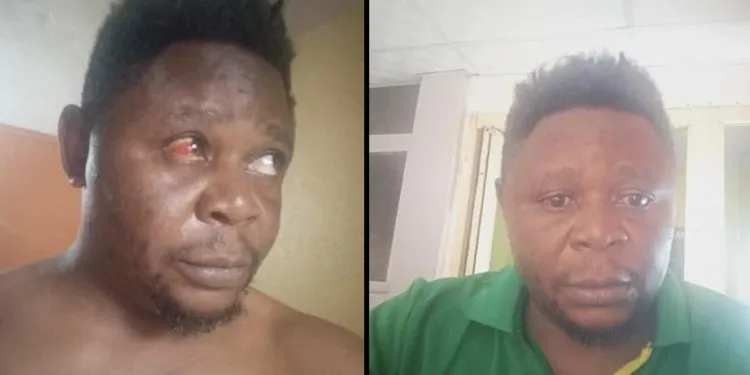A Cameroonian human rights activist, Tse Anye Kevin, has accused the Nigerian police of wrongful arrest, severe physical abuse, and illegal detention. Kevin claims he was falsely implicated in a kidnapping and terrorism case, leading to his harrowing ordeal at the hands of Nigerian authorities.
Kevin, a prominent pan-Africanist, trade unionist, and former Vice President of the Confederation of Cameroonian Trade Unions, shared his story with SaharaReporters after his release. He recounted that the nightmare began in the early hours of October 2, 2024, when heavily armed officers from the Nigerian Police Department’s Zone 2, Onikan, Lagos Island, stormed his home without prior notice or a search warrant.
“They greeted me with slaps and severe beatings,” Kevin said. Despite his attempts to explain that he was neither a kidnapper nor a terrorist, the police allegedly threatened him with torture if he did not confess to the accusations.
Allegations of Torture and Inhumane Conditions
During the chaotic search of his home, the officers seized Kevin’s personal belongings, including his laptop, documents, and phones, before handcuffing him and taking him to their headquarters. There, he was formally accused of involvement in kidnapping and terrorism, both in Nigeria and internationally—charges Kevin vehemently denies.
“They shouted questions like, ‘Where is your gun? Where are the other gang members?’ I was shocked and kept telling them I had no weapons, no gang, and that I wasn’t a kidnapper,” Kevin said. Despite his protests, he was warned that if he did not confess, he would be taken to a torture chamber where they would “hang him, peel his skin, and force him to confess.”
Later that evening, Kevin was transferred to an overcrowded jail cell, where 43 inmates were crammed into a space of just 4 square metres. “There was no room to sleep, and we were practically suffocating,” Kevin told Saharareporters. He also recounted enduring further beatings in custody, which left him with severe head pain, body aches, and vision issues for which he is now seeking medical treatment.
Accusations Tied to Cameroonian Government
Kevin claimed that the Nigerian police told him that the Cameroonian government had made the accusations against him and had set a bounty on his capture. He was told his repatriation was imminent. However, he noted that one officer, the Officer-in-Charge (OIC), appeared to have a more sympathetic perspective. The OIC reportedly questioned whether Nigeria would send refugees from war-torn countries like Ukraine, Israel, or Palestine back to face persecution and advised the investigators to treat Kevin well.
“He seemed to understand that human rights activists fleeing crises should be protected if they seek refuge in Nigeria,” Kevin said. “He told the investigators he was personally interested in the outcome of my case.”
Support from Nigerian Human Rights Activists
Kevin credits his eventual release to the intervention of several Nigerian human rights activists, particularly Omoyele Sowore, a former presidential candidate and activist with the African Action Congress (AAC). Kevin also acknowledged the support of other key figures, including Comrade Netufo Tommy, Comrade Wiseman, Mr. Femi Falana (SAN), and Comrade Chris Uyot of the Nigeria Labour Congress (NLC).
“I owe special thanks to Leader Sowore, who personally secured my bail on the 3rd of October, 2024. My heartfelt gratitude goes to all those who assisted but whom I may not have mentioned here. May God and our ancestors bless you all abundantly,” Kevin said.
Efforts by MMI to reach representatives of the Nigerian Police for comment were unsuccessful, as calls and messages sent to their spokespeople went unanswered.
History of Human Rights Abuses
This is not the first time Nigeria is engaging in acts of human rights abuses against Cameroonian activists and persons critical of the Regime or fighting for the right to self-determination. In January 2018, Sisiku Julius Ayuk Tabe, the leader of the Ambazonian separatist movement, was arrested in Abuja, Nigeria, along with 46 other members of his group. This arrest, carried out by Nigeria’s Department of State Services (DSS), marked a significant escalation in the ongoing conflict between Cameroon’s Anglophone minority and the central government.
Ayuk Tabe and his associates were accused of engaging in activities aimed at undermining the Cameroonian government. Despite the DSS initially denying involvement, eyewitnesses reported that the separatist leaders were taken from a hotel by armed men in military gear. The arrest was condemned by human rights advocates, including Nigerian lawyer Femi Falana, who argued that the detention violated their right to self-determination as protected by the African Charter on Human and Peoples’ Rights1.
The situation took a controversial turn when Ayuk Tabe and his colleagues were forcibly deported to Cameroon. This extrajudicial transfer was widely criticized, with the United Nations Refugee Agency denouncing it as a violation of the principle of non-refoulement, which prohibits the return of individuals to a country where they may face persecution. Despite these objections, the Cameroonian government proceeded with their trial, leading to Ayuk Tabe and nine others receiving life sentences in August 2019.
The arrest and subsequent deportation of Ayuk Tabe have intensified the conflict in Cameroon, drawing international attention to the plight of the Anglophone minority. The actions of the Nigerian and Cameroonian governments have been scrutinized for their legality and adherence to international human rights standards, highlighting the complex and often contentious nature of geopolitical interventions in separatist movements.



